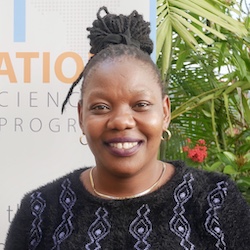Bio
Margaret Monyani is a doctoral candidate at the University of the Witwatersrand, South Africa pursuing a PhD in international relations. Her dissertation focuses on international migration regimes specifically the global dynamics associated with refugee governance from an African standpoint by exploring the livelihood situations of Somali women refugees in Nairobi, Kenya. She also holds a Master’s degree in international relations and a Bachelor of Arts degree in political science (with first class honors) from Moi University, Kenya. She is currently a teaching assistant in the Department of International Relations at the University of the Witwatersrand, Johannesburg. She has also participated in various undergraduate courses ranging from national politics, international relations, gender, human rights, security and international migration taught in the Department of Political Science and Public Administration at Moi University. Monyani’s exemplary academic performance has earned her prestigious fellowships such as the Andrew Mellon Governing Intimacies Project (2019), Academy for African Urban Diversity Fellowship (2018), Erasmus Mundus International Credit Mobility Fellowship (2018), and Next Generation Social Sciences in Africa Research Fellowships (2017, 2018, 2019). She is a versatile, upcoming scholar and author, with skills in execution of academic and policy research projects as well as leadership experience ranging from civil society to academic spheres. Monyani is also a research affiliate with the Refugee Law Initiative, University of London.

